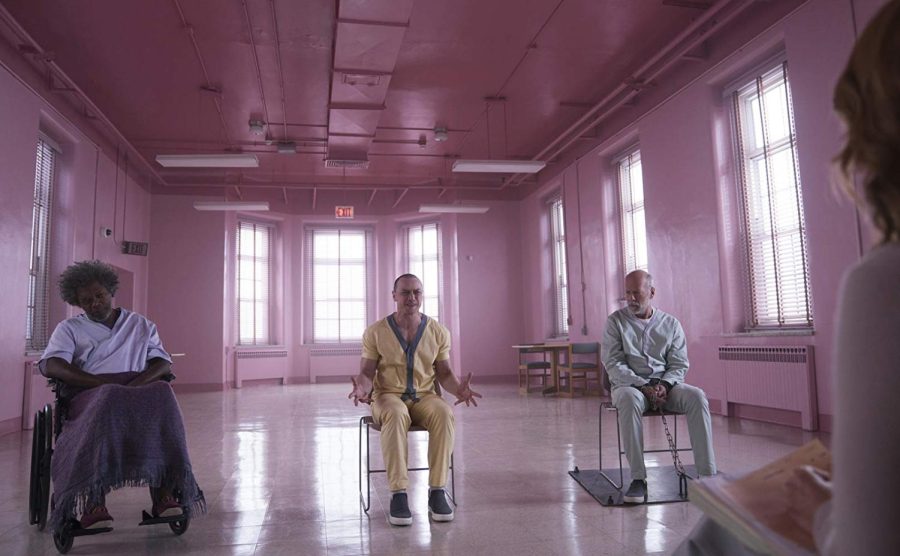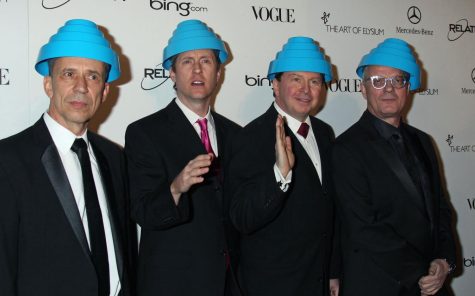REVIEW: Shyamalan’s ‘Glass’ is an enigma with a good heart
(From left) Samuel L. Jackson, James McAvoy and Bruce Willis in “Glass,” the third film in M. Night Shyamalan’s “Unbreakable” trilogy.
January 23, 2019
We’re going to be talking about “Glass” for a long time.
Writer/director M. Night Shyamalan’s trilogy finisher is equal parts confounding and uplifting, allowing the auteur to show why we fell in love with him in the first place, but also why he fell out of favor along the way.
“Glass” is the last film in a two-decade-old trilogy, following 2000’s “Unbreakable” and 2017’s “Split.” “Unbreakable” remains today Shyamalan’s second-best movie — long live “Signs” — and “Split” dominated the box office so convincingly two years ago that it forced younger viewers to seek out the former.
“Glass” marks the first time the characters from the two previous films meet. David Dunn (Bruce Willis), the only man to survive a trainwreck that killed 131 people in “Unbreakable,” has began using his powers and abilities for good. Like a poor man’s Batman, literally, he sweeps the streets of petty criminals with vigilante justice.
Meanwhile, Kevin Wendell Crumb (James McAvoy), a man whose dissociative identity disorder has forced his mind into taking on dozens of distinct personalities, has continued his trend from “Split” of kidnapping teenage girls, using them as food for “The Beast,” a superhuman persona. Dunn and The Beast face off briefly before getting caught up by the authorities, and they are placed in a psychiatric hospital.
The film undoubtedly has highs and lows, but it goes no lower than the painfully boring half-hour or so in the hospital. Mr. Glass (Samuel L. Jackson) is also in this facility, placed there after committing multiple acts of terrorism in “Unbreakable.” The only problem is that Shyamalan makes a choice to have Mr. Glass be sedated for a good portion of the film’s first act, relegating Samuel L. Jackson, one of the most charismatic and eye-catching actors we have, to pure ennui for the first hour.
Once Jackson is allowed to show his real portrayal of Mr. Glass, the movie picks up significant steam. All the performances are great, notably McAvoy’s and his uncanny ability to switch personas on the fly.
But the best part of “Glass,” as it was with “Unbreakable,” is Mr. Glass himself. The character believes comic books are one of the last recordings of true human history, and essentially, that they’re real, and so are superheroes. The back-and-forth between Jackson and Willis is poignant and beautiful, trying to convince him to come out of the shadows and embrace who he really is.
FILM FACT BOX
Title: Glass
Director: M. Night Shyamalan
Starring: James McAvoy, Samuel L. Jackson, Bruce Willis, Anya Taylor-Joy, Sarah Paulson, Spencer Treat Clark, Charlayne Woodard
Writer: M. Night Shyamalan
Runtime: 129 minutes
That’s one of the most effective parts of “Glass.” Despite its meandering plot and sometimes downright goofy story beats, the message remains clear: Be yourself, or as Anya Taylor-Joy’s character, Casey, says, “Come to the light.”
This feels like Shyamalan talking to us personally, accentuated by his choice to have many characters look straight down the camera to deliver their lines. He’s been someone who has been at the top (“The Sixth Sense”) and the very, very bottom (“The Last Airbender”), and it feels like “Glass” is almost his story, his true coming-out party. Shyamalan seems to be saying, “This is who I am, and everyone else has to deal with that.”
It’s certainly not Shyamalan’s best movie, but it’s the movie where Shyamalan shines through the brightest.
Technically, the film is a mixed bag. The cinematography, composition-wise, is beautiful, gently balancing the three protagonists on screen. But the color palate wavers between too dark, what-the-hell-am-I-looking at blacks to feverish pinks. West Dylan Thordson’s score is haunting and adds to the tension beautifully.
The part that everyone’s going to be talking about for a while, though, is the ending. I won’t spoil it here, but it is certainly confounding, but not necessarily “bad.” It’s not hard to see what Shyamalan was going for, but it’s also hard to defend it or see it as anything other than unnecessary padding to tie up loose ends.
“Glass” is a frustrating code to crack, but that’s all we can expect of Shyamalan. It’s who he is as a filmmaker, and personally, I’d rather have all his films be swings-and-misses than for him to strike out looking. “Glass” isn’t perfect, but it’s a worthwhile conclusion to these characters’ stories.
GRADE: B
Cameron Hoover is a film critic. Contact him at [email protected].

























